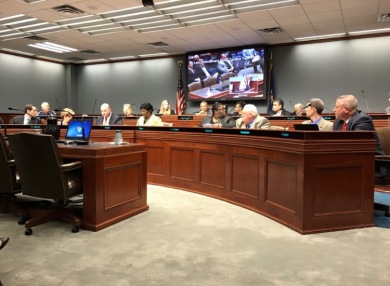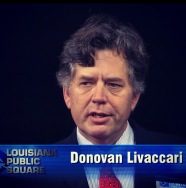
The FOP Legal Defense Plan provides legal representation to its members for any criminal or civil action resulting from the performance of your duty as a law enforcement officer. The FOP Legal Plan also provides representation for any administrative investigation. Administrative investigations include disciplinary investigations, Accident Review Board cases, or Rule IX Hearings. In addition, the administrative coverage includes appeals to the Civil Service Commission, the Fourth Circuit Court of Appeal, or the Louisiana Supreme Court, if needed.
The NOPD keeps hiring new officers and running academies on a regular basis. This means that there are always new officers coming out of the Academy who have not had any experience with the NOPD’s disciplinary system. I usually have the opportunity to introduce myself to soon-to-be Academy graduates at the Academy. I have a limited amount of time to introduce myself and explain a few things about the Legal Plan. This is my opportunity to explain a little more in depth. As always, you are welcome to call me if you have any questions.
The Consent Decree entered into by the City of New Orleans and the Department of Justice contains 13 pages that apply to disciplinary investigations. The one thing that has impacted the disciplinary system the most is the requirement that the NOPD investigate all complaints based on the allegation as opposed to the anticipated outcome. The NOPD has interpreted this to mean that they are going to investigate any complaint, regardless of its facial merit. The Consent Decree also formalized the NOPD policy to accept all complaints, whether they are in person, anonymous, from third parties, via email, etc. I had one case where someone in Australia didn’t think that an officer treated someone right based on an episode of a television show he saw. Finally, the Consent Decree limits the cases that can be disposed of as NIM (No Investigation Merited).
The Consent Decree initially led to an increase in the number of disciplinary investigations. However, with the use of body worn cameras, and tools such as Non-Disciplinary Counseling, Negotiated Settlement, and Mediation, the number of disciplinary investigations looks to have topped off and dropped a little the past few years. That being said, there are still more than 700 PIB Control numbers used every year.
First and foremost, I have a lot of people call and say “I hate to bother you with something this stupid…” Nothing is that stupid. Stupid things are stupid because 1) someone did something stupid and there is no explaining it away, or 2) someone made an allegation that is so ridiculous that you can’t possibly imagine it being sustained.
In the first case, where someone does something stupid – made a simple mistake or error – and there is nothing that can explain it away, there is certainly good reason to call. The FOP offers a benefit known as the Salary Reimbursement Option. No other organization offers anything like it. Here is how it works:
Salary Reimbursement Option (SRO)
The FOP Legal Defense Plan provides legal representation to its members so that they can defend themselves from accusations that constitute a violation of rules and regulations. This representation includes appeals, if necessary. However, sometimes you are accused of something that you did. For example, maybe it was one of those days and by the time the tenth person has lied to your face, you had enough and uttered a string of profanities. This string of profanities was recorded on your body worn camera. Now, you are accused of violating the NOPD’s rule on Courtesy (Rule 2, Paragraph 2). The complaint will be sustained.
Your FOP attorney will argue on your behalf. If there is a way out, we will explore that. If there is no way out, then we will argue for the least possible penalty. This is when the Salary Reimbursement Option comes into play.
IF you are represented by an FOP attorney and the penalty involves a suspension, you and your FOP attorney will have the opportunity to discuss your options moving forward. You probably have an option to appeal. However, IF you are represented by and FOP attorney AND you and your attorney agree that your chances of success on appeal are slim, then the FOP will reimburse you for any suspension days at $150/day for up to 5 days. That’s right – if you get a suspension for something that you did and you are not going to prevail on appeal, you can get a check for $150 per suspension day from the FOP in lieu of appeal. In short, instead of wasting money appealing a suspension you are not going to win, you have the option of cutting your losses and, hopefully, getting back to even. YOU MUST BE REPRESENTED BY AN FOP ATTORNEY DURING THE DISCIPLINARY INVESTIGATION TO BE ELIGIBLE FOR THE SALARY REIMBURSEMENT OPTION. You can only be represented by an FOP attorney for a disciplinary investigation if you pick up the phone and call.
If you aren’t calling because the allegation is stupid and there is no possible way it could be sustained, you should know that plenty of stupid allegations have led to sustained violations. Additionally, it keeps your options open for the Salary Reimbursement Options.
Do they need to notify you of a pending complaint?
No. The NOPD is not required to notify you that you are the subject of a complaint. Some investigators do notify the accused officers.
Many people find out about pending investigations when they receive a notice from the Civil Service Department of an upcoming hearing. The letter states that the Department has request an extension of time in pursuant to Civil Service Rule IX, Sec. 1.4. If you get one of those notices, then you are an accused officer in a formal disciplinary investigation.
Extension Request Hearings
The Louisiana Police Officer Bill of Rights, La. R.S. 40:2531(b)(7), provides that administrative disciplinary investigations have to be completed within 60 days. It also gives investigators the option of requesting up to another 60 days, for a maximum of 120 days to complete the investigation. The investigator needs to show good cause for the extra time.Unfortunately, just about any excuse serves as cause for the extension. The letter says that you have to attend. However, if you call me, I can handle that hearing for you. These hearings can be good opportunities to learn some information. You can also agree to the extension. There are times when agreeing to the extension may be in your best interest.
There are many other ins and outs to the disciplinary system. There are statements, disposition notices (NOPD Form 308), Pre-Dispositions Conference Hearing Notices, Pre-Disciplinary Hearing Notices, Pre-Dispositions Conferences, Pre-Disciplinary Hearings, Penalty Matrices, Disciplinary Letters, Civil Service appeals, other appeals, etc. I will cover those in the next post.





 Recently committee Chairman Franz Borghardt, Louisiana FOP President Darrell Basco, and others appeared as panelists on the
Recently committee Chairman Franz Borghardt, Louisiana FOP President Darrell Basco, and others appeared as panelists on the 


 Periodically, I like to take a moment to make sure people are up to speed on the status of formal disciplinary investigations for NOPD and the benefits provided by the FOP Legal Defense Plan.
Periodically, I like to take a moment to make sure people are up to speed on the status of formal disciplinary investigations for NOPD and the benefits provided by the FOP Legal Defense Plan.